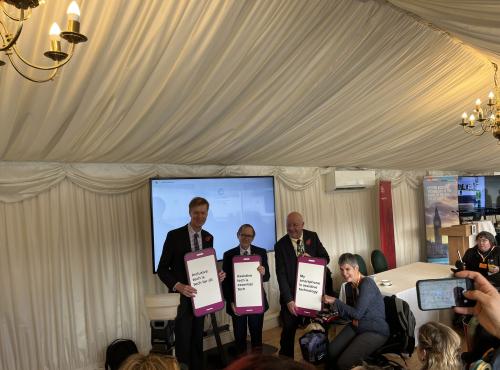Climate Policy Dashboard Update: Trees and Peat Action Plans
Policy Connect updates its Climate Policy Dashboard for the first time since its launch in response to the England Tree Action Plan and England Peat Action Plan, which set out the Government's policy approach for the management, protection and restoration of woodlands and peatlands.
The new policies contained in these publications increase the Government’s score in the agriculture and land use sector from 4/10 to 5/10.
"On the Climate Policy Dashboard’s first update since its launch, the Tree and Peat Action Plans include positive steps which mark the agriculture and land use sector as being on the way to world-leading climate policy. However, there is still much more to be done by the Government to improve the sector’s ranking on the Dashboard. This will ensure that the rhetoric behind these plans meets the reality of the change that is needed." - Nazza Ahmed, Policy Connect
It is welcome that the Government intends to phase out the use of peat in horticulture and ban the sale of peat and peat containing products in the amateur sector by the end of this parliament, subject to consultation this year.
The England Tree Action Plan commits the Government to provide funding for public and private sector nurseries and seed suppliers. Another positive measure from the Plan commits the Government to review the tax treatment of trees and woodlands to ensure that tax incentives align with their environmental goals.
However, there are areas where no progress has been made. This is notably in the England Peat Action Plan, where the Government has not set out any obligations for water companies to restore peatland on land that they own or for peatland owners on a Site of Special Scientific Interest (SSSI).
There are also areas where the Government could do more. The England Tree Action Plan acknowledges the need for private finance to drive afforestation; however, there is a lack of policy detail on what mechanisms will provide the necessary private finance to achieve this.
The £50 million funding for peatland restoration is also welcome and will restore 35,000 hectares of peatland by 2025, but this is only 5% of England’s total peat soils. The Climate Change Committee recommends all upland peat to be restored or stabilised by 2045 and 40% of lowland peat be restored by 2050.
Key actions for the Government on the road to world-leading policy in the agriculture and land use sector include:
- Setting out the mechanism by which afforestation can be funded via private investment. This could come in response to the call for evidence on greenhouse gas removal methods, including afforestation, that BEIS launched in December 2020.
- Providing sufficient public funding for both afforestation and peatland restoration, where the private market cannot deliver sufficient ambition.
- Delivering greater ambition and clarity on long-term peatland restoration targets as part of the forthcoming Net Zero Strategy.



